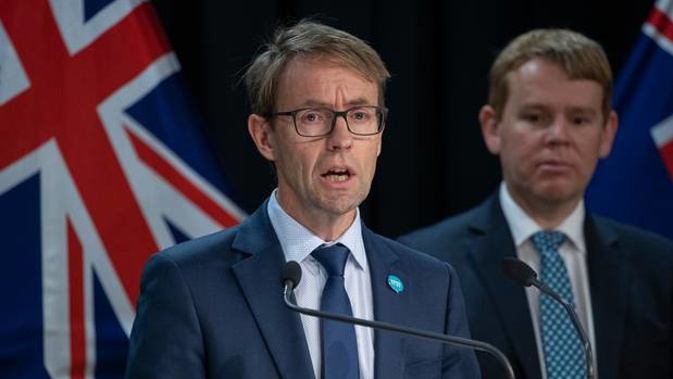
Households should add masks to their emergency supply kits in the case of further Covid-19 outbreak, Health Minister Chris Hipkins says.
They do not need to be medical-grade masks, he said. It comes as New Zealand recorded no new Covid cases in the past 24 hours.
If New Zealand moves to alert level 2, at that point Kiwis will be encouraged to wear masks where physical distancing isn't possible, like on public transport.
Hipkins said the change in opinion on masks was reflective of updated WHO guidance.
Hipkins said he "utterly reject that" the Government is scaremongering, as they've been accused by National.
"I would encourage Gerry Brownlee to swap the tinfoil hat for a face mask".
/cloudfront-ap-southeast-2.images.arcpublishing.com/nzme/POOTQL3HOFDHFDSSJLLMHJOGPE.png)
Hipkins said it wasn't "scaremongering" to say "it could all change" very quickly when it came to Covid-19.
"That is a statement of fact."
Hipkins said it was vital to stay "ever vigilant" about Covid-19 as the virus wouldn't be taking six weeks off for the election.
Hipkins reiterated there was no community outbreak but said people should prepare in case that did happen.
"This is about general preparedness - it's about being ready, it's not cause for alarm," he said.
Hipkins has masks on order for his family and already has some disposable ones.
Director general of health Ashley Bloomfield said masks were "one tool in the toolbox" to help reduce the risk of spread of Covid-19 between people.
There is guidance on the Ministry of Health website about how to put on a mask, including a demonstration by Bloomfield.
Bloomfield said the masks could be reusable ones which could be bought online or at stores.
No new cases today
It's now been 97 days since a case of community transmission and there are no new cases today, Bloomfield said.
There are now 23 active case after 1 person recovered in the past 24 hours.
Just over 5000 tests were processed yesterday.
Bloomfield said it was encouraging to see the rise in testing numbers and repeated how important it was for people to get tested if needed.
CovidCard trial
The Government is trialling the CovidCard in Rotorua with about 250-300 people to help with contact tracing.
The cards could be deployed later this year, but ministers say at this point they're not anticipating making them mandatory.
Minister of Government Digital Services Kris Faafoi said the trial would help researchers understand how the cards would work "in the real world".
An earlier trial conducted in May by the University of Otago in conjunction with the Nelson Marlborough DHB found the CovidCard worked under controlled conditions "so we believe there is merit in exploring it further".
"This research will allow us to understand how the cards would work in a real-world scenario, whether they are compatible with our contact tracing systems, and whether the public would accept and use the cards if they were rolled out," Faafoi said.
Rotorua community leaders and iwi have been consulted, he said.
Health Minister Chris Hipkins said initial assessments highlighted that the CovidCard could make "a real contribution" to New Zealand's contact tracing processes.
"While manual processes remain the critical component for contact tracing, we know digital solutions can help make contact tracing faster and more effective. This is important from a public health perspective and also in supporting our economic and social recovery," Hipkins said.
"It's fair to say that no single technology to 'solve' contact tracing has been identified anywhere in the world. That's why we need to explore all available technology options.
"We are continuing to improve the NZ Covid Tracer app, which includes looking at how technologies like Bluetooth can be utilised to further support contact tracing and have also been investigating the proposed CovidCard."
Key considerations will include whether the CovidCard meets high security and privacy standards and can be used by a wide range of New Zealanders, Hipkins said.
He said the CovidCard technology was another tool in the toolbox for contact tracing system as digital solutions can make it quicker.
Part of the trial will look at whether the public will accept and use the CovidCard.
PPE use
New Zealand had "very strong" levels of personal protective equipment (PPE) and some was available to the public to purchase, Hipkins has told Parliament.
"I'd certainly encourage them to do that. As they have an earthquake preparedness kit at home, they should have a kit at home to prepare for any further outbreak of Covid-19 as well."
Hipkins and Bloomfield have both previously said people should prepare for a second outbreak of Covid-19 in this country.
Bloomfield told RNZ yesterday that the ministry was actively looking at scenarios where mass masking may be required.
"We're looking at situations where masks might be deployed and recommended for the general population," he said.
"Our thinking at the moment is that even at alert level 2 we would be encouraging people to use them in confined spaces, so public transport, shops and so on."
But that would be considered voluntary at level 2, he said, and his intuition is that it would be ramped up to mandatory at level 3.
"Because, remember, you're deploying all these things, including the masks, to try and avoid going into a lockdown again."
While there were no firm decisions on masks yet, he encouraged people to have some stocked at their homes, in the same way they have an earthquake kit in case of emergencies.
Take your Radio, Podcasts and Music with you









